“Why me? Haven’t I been through enough?”: She grew up in a KL nightclub with a mum who was a kept woman
This Christmas, Salt&Light brings you a series of stories on new beginnings. Your life can begin again too.
by Christine Leow // December 21, 2021, 3:15 pm
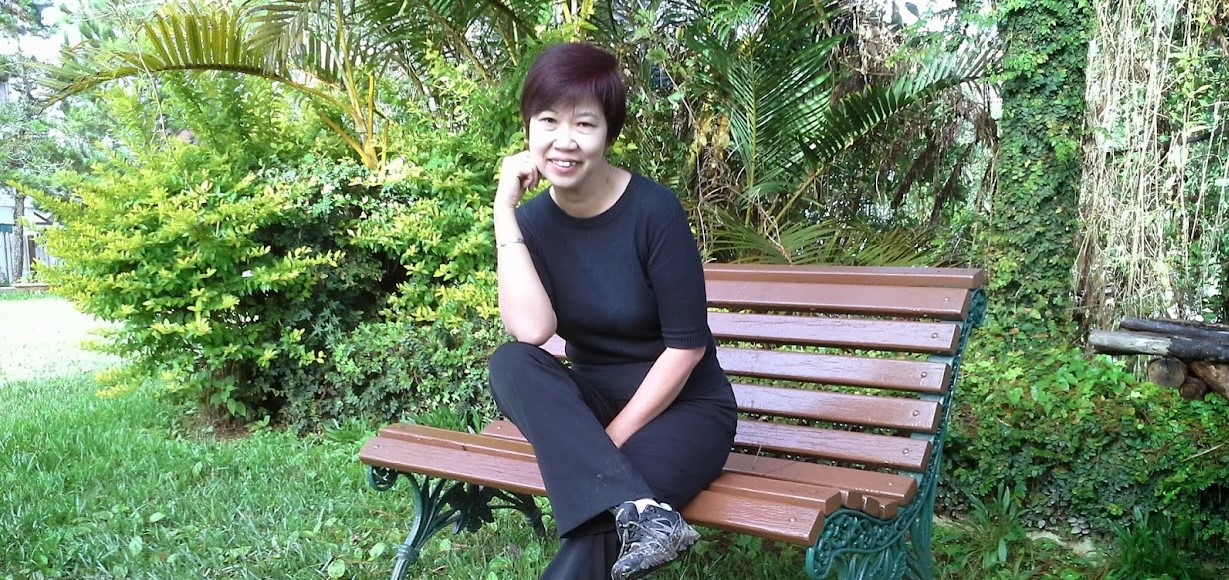
Corporate trainer Prisca Loke shares her life story as part of the workshops she runs to both encourage the participants and testify of God's goodness. All photos courtesy of Prisca Loke.
Hers was not the most secure of childhoods.
“I never knew my father. My mother wouldn’t say much about him and my relatives didn’t say anything,” said Prisca Loke, 57.
“I wasn’t bothered by it. Maybe it’s my nature. I’m quite accepting of things.
“Mo lo tao zao mo lo tao lor (so what if I have no father). But that didn’t mean there wasn’t a place in my heart for queries or curiosity.”
The little that Prisca knows of her father is this. She has one.
“I never knew my father. My mother wouldn’t say much about him and my relatives didn’t say anything.”
“Throughout my growing up years, I thought I was illegitimate, that I had no father. But I have one because his name is on my birth cert.”
Her father is 20 years her mother’s senior. When Prisca was just two months old, their relationship fell apart and her mother took baby Prisca to live with her family.
“I was quite an aggressive little girl. I would fight with my older cousins. We would beat each other up. I was very good at fighting.
“We spoke Cantonese and I learnt all sorts of foul language from them. My foul language was top class!” Prisca said with a laugh.
By the time Prisca was three, her mother would move out once more to work in Kuala Lumpur.
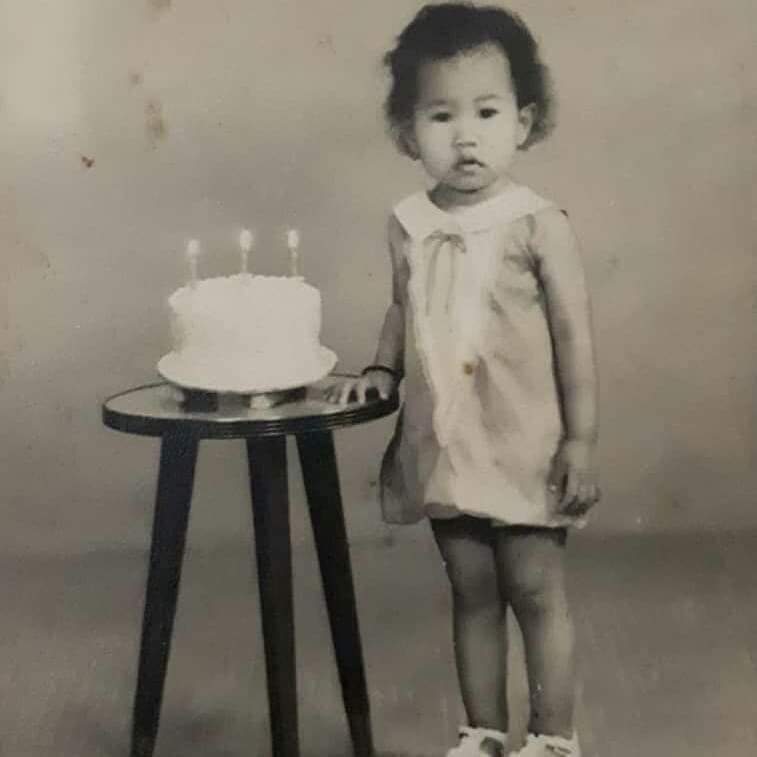
Three-year-old Prisca was living with the maternal side of her family when this picture was taken.
“She was a guest relations officer at a nightclub in KL – what you would call a bar girl.”
Prisca was sent to live with a series of nannies in her mother’s hometown of Ipoh.
At one nanny’s house, “I was tortured by the nanny. She would pinch me. It was never very pleasant.”
Eventually, her mother took her to another nanny who “changed my life”. By then, Prisca was five.
A young fighter with a foul mouth
For the next decade, Prisca lived in the loving home of her new nanny.
“My nanny had three sons and a daughter, and I followed them to church. I said the sinner’s prayer and everything.”
“My mum would take me to KL with her. That’s when I found out she was a kept woman.”
The tough little girl who fought and had a foul mouth – “my nanny used to say, ‘This girl is garang sikit (feisty)” – was tamed by the firm hand of her nanny who was “very strict with me”.
“Till now, we are very close. They consider me like their own family. I call her Godmum.”
Asked if she ever resented being left behind in Ipoh or questioned her mother’s decision, Prisca said: “I’m not the kind of person to ask questions. I just go with the flow.”
But Prisca believes it all worked out for good.
Living with her nanny gave her the stability she never had and the chance to become a Christian, both of which she credits with keeping her on the right path despite her early exposure to the underbelly of society.
“Sometimes, during the holidays, my mum would take me to KL with her. That’s when I found out she was a kept woman. First by one man then by another.
“Because of God, somehow or other, something good comes out of bad things.”
“My nanny lived in a large house with many rooms. She would rent out these rooms to women like my mum and would babysit their children.
“My childhood friend was the daughter of mamasan (woman who runs a brothel). We promised each other that we would not follow in our mothers’ footsteps.”
While Prisca managed to keep her promise, her friend did not.
“She fell into that lifestyle and ended up sharing a husband with another woman.
“I feel my life has been preserved by God. Because of Him, somehow or other, something good comes out of bad things.”
Faith in the midst of humiliation
The year Prisca turned 16, she went to live with her mother in Kuala Lumpur. Her nanny had downgraded to a smaller home and there was not enough room for Prisca.
“That was when the interesting lifestyle started,” she said wryly.
By then, her mum, still a “kept woman”, was “moving from man to man”. Prisca would follow her to the different houses.
“I just felt that if I didn’t hang on to God, I may go the wrong way.”
She even got quite close to one of them who treated her very well.
“But one night, my mother suddenly told me that the man’s estranged wife was coming back to him and was going to chase us out of the house.
“We had to run away. We suffered some humiliation.”
Life became more unstable after that.
Her mother was a gambler and they often did not have enough money.
“At times, we had to share meals. During Chinese New Year, we didn’t have money to buy anything.”
Her mother also drank a lot. “Once she was so drunk, she came home and squatted in the room and nearly peed on my face.”
“I was kind of hopeless because of the life I had, yet hopeful because I had God.”
Each day after school, Prisca would go to her mother’s nightclub. At the time, they were renting a room in a house whose other tenants included drug addicts and people from the seedier side of life. Her mother felt Prisca would be safer where she could keep an eye on her.
“At the nightclub, I could see the people going about their work – drinking, flirting. I would have to wait till my mum finished work at 1am, then drag myself home with her.”
Her resolve to never follow in her mother’s footsteps strengthened further.
In Kuala Lumpur, Prisca attended a church introduced to her by her Ipoh church friends and threw herself into church activities. She sang in the choir and was a youth leader.
“When I was in Form 5 (age 16), I re-dedicated my life to Christ. It was then that I really understood what it is to believe in Jesus.
“I just felt that if I didn’t hang on to God, I may go the wrong way. The draw of that kind of lifestyle was always there.
“So, I was kind of hopeless because of the life I had, yet hopeful because I had God.”
Lonely and in the “wilderness”
In her early 20s, “disappointments with church” made Prisca leave. “I also left God. All the things I knew, all that I had learnt, I gave it up.”
By then, she was working and had rented a room on her own. Without her church community, she was lonely.
So, the girl who vowed never to have any part in the night life started going to clubs with her colleagues. It was while clubbing one night that she met her future husband.
For seven years, she was “in the wilderness”.
“There was a lot of emptiness and a lot of shame during those years.”
“I married a non-believer. I had a lot of guilt about my decision. I knew about not being unequally yoked (2 Corinthians 6:14) yet I still went ahead with it.
“There was a lot of emptiness and a lot of shame during those years.”
It did not help that her husband was “a typical Chinese man” and not very communicative or demonstrative of his affections.
“In my early days of married life, I almost went into depression.”
But as she had been preserved in her childhood, Prisca would be preserved once more.
By 30, she was mother to a son and was working as a manager overseeing a condominium.
“Somehow, in our company there was a group of Christians who organised a Christian Fellowship and I got invited.
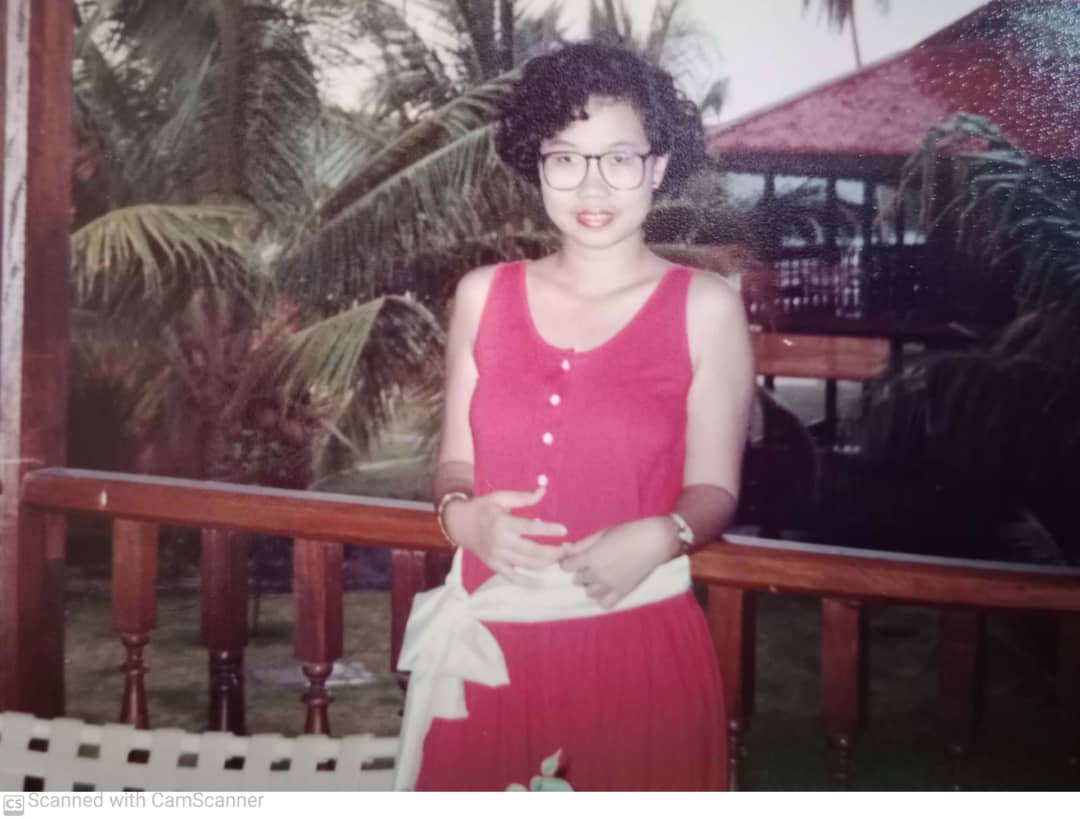
After graduation, Prisca would save up money from her work to attend courses to improve herself so she could advance in her career.
“I started to feel that warmth and the loving presence of God and the community again. You see how good God is to prepare all this?”
“I told God that I never wanted to be in the wilderness again. It was a terrible feeling, the emptiness.”
This would go on for three years during which her desire to return to church increased. Her godbrother who had relocated to Kuala Lumpur introduced her to a church near her home.
Prisca has been attending the church since.
Out of her decision to walk away from the church years earlier, one important lesson she learnt was to focus on “building our relationship with the Lord Jesus” instead of putting expectations on the church.
“We are still mere man who are being transformed by God each day.
“I told God that I never wanted to be in the wilderness again. It was a terrible feeling, the emptiness.”
Forgiving the father she never knew
The return to church would mark a new phase in Prisca’s life.
“Now, I have a great Father. So, it’s okay that I don’t have an earthly father.”
“I attended counselling to help me with my guilt. I renounced my past life and went through inner healing.”
Through those sessions, she learnt to forgive the father she never knew.
“Now, I have a great Father. So, it’s okay that I don’t have an earthly father.”
She also dealt with her feelings about her mother.
“In the early years, I put a lot of blame on her. I harboured a lot of inner hate for her for making me go through the shame and humiliation.
“I had to work very hard to come to a place where I could see that she sacrificed for me.”
“I harboured a lot of inner hate for her for making me go through the shame and humiliation.”
Coming to terms with her emotions – “it was a tug of war, the blame and the need to be filial” – gave Prisca the ability to support her mother when the latter became ill.
Her mother passed away at age 59 from Stage 4 breast cancer, but not before becoming a Christian.
“Our cell group prayed for her and she attended a Chinese service. In her last days, we talked a lot, there was a lot of patching back.”
She guided her mother to forgive her father as well.
“I told her, ‘You need to forgive dad. Then, you will get release yourself.”
Changed by hardship
But there would be more valleys to come.
As Prisca’s son reached his teens, she noticed a change in his behaviour. He became rebellious. Never one to enjoy studying, he started playing truant and stealing from her to go out with his friends.
“I felt like I was reliving that kind of nightmare that I was not good enough.”
“Things went haywire. I scolded him, even beat him one time.”
In a particularly heated exchange, Prisca was reminded of a casual comment she had made when her son was young. She once told him that, when she turned 45, she would quit her job to spend more time with him. She never did.
What surprised her was that he had remembered her promise, and had cared enough to resent her when she failed to keep it.
“I didn’t know my son was such a sensitive boy.”
So, Prisca quit her job to spend time with her son. The decision came at no small cost because she resigned before completing an agreed stint with her company.
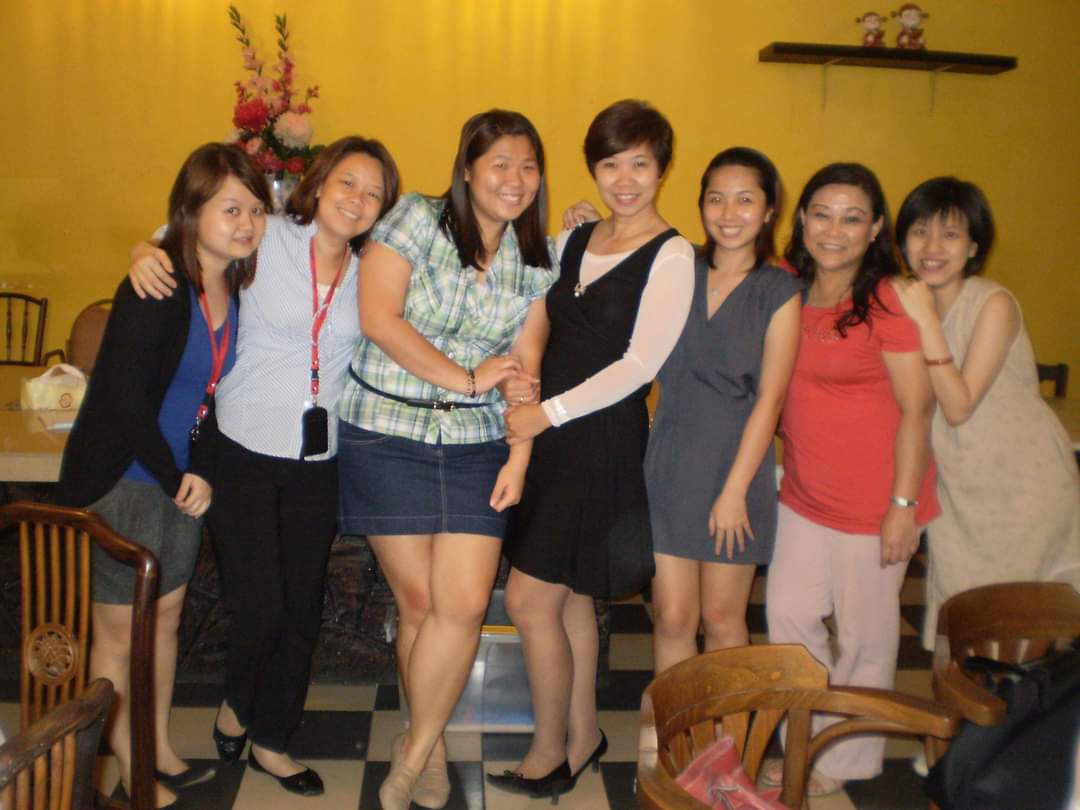
Prisca (middle in black) on the last day of her corporate career. She quit her job to spend time with her son.
“I was supposed to get RM$40,000 upon the maturity of a scheme. I left early and didn’t get a single cent.”
Her husband had quit his job then, too, to start his own business. Their two incomes were reduced to a rather unstable one.
But more than the heartache of financial loss was the heartache of reaching out to her son.
“God told me that He had strengthened me in every way and that no matter what happened, I would be able to stand.”
He quit school, refused her offer to pick up a skill and went to work instead. Without qualifications, he had to contend with odd jobs at construction sites and F&B outlets. He also left church.
“I felt like I was reliving that kind of nightmare that I was not good enough, that I didn’t do certain things for my children.”
During that forced hiatus, Prisca spent time with God in prayer and contemplation. As she quietened her heart, God revealed areas that she needed to change.
She realised that, because of her nomadic childhood and years of lack, money had a strong hold over her.
That was why she worked hard and kept improving herself with course after course in the hope of better jobs and better pay.
She also had low self-esteem.
“To hide my low self-esteem, I became very proud, defensive. My colleagues thought I was a porcupine.
“But one by one, the Lord cleansed it all and settled it for me. In my room, there must have been buckets of tears because that was where I did my reflection.
“The most painful thing in my life was dealing with my son. But it has also become my sweetest victory.”
“I would pray and ask Him, “Why me? Is it not enough that I had a childhood like that? Now, I have to deal with this?’
“But God told me that He had strengthened me in every way and that no matter what happened, I would be able to stand.”
In time and with effort, the relationship between mother and son started to mend. Now, at 25, Prisca’s son lives in Australia and works as a fruit-picker.
“I have accompanied him to the extent that he can say, ‘Don’t worry about me now. I’m sorry for the past.’ We are now very close.
“The most painful thing in my life was dealing with my son. But it has also become my sweetest victory.”
Her son who once professed to not enjoy school is now a voracious reader. Though still disillusioned by church, he is open to prayers.
“I told him, ‘I’m praying for you. Mummy only knows how to pray.’ And he asks me to pray for him. When I asked if he still believed in Jesus, he said that he still did.
“I told him, ‘I’ve not seen your ending. I believe there are good things that will come out from you.’”
Good from the bad
Today, Prisca is a corporate trainer, a career she had always wanted but had been too afraid to venture into because of the uncertainties, until the year of reflection she had with God.
“Starting the business wasn’t easy. I was a bit scared. But sometimes, if situations don’t push you, you will never move in a certain direction.”
“I told him, ‘I’ve not seen your ending. I believe there are good things that will come out from you.’”
Contrary to her fears that projects would be hard to come by, Prisca has had a steady flow of work even during the pandemic.
“When I worry when jobs get cancelled, God says, ‘Why are you worrying? Do you believe that in the next five minutes, I will give you two jobs?’
“And the phone actually rings and two jobs come. Now, I’m very relaxed even when things get cancelled.”
As a trainer, she gets to tell her story often. “The Bible says we need to testify in public (Revelation 12:11).
“People are shocked when I tell them my life story. A lot of times, they are touched. They say they have never met a trainer so willing to open up.
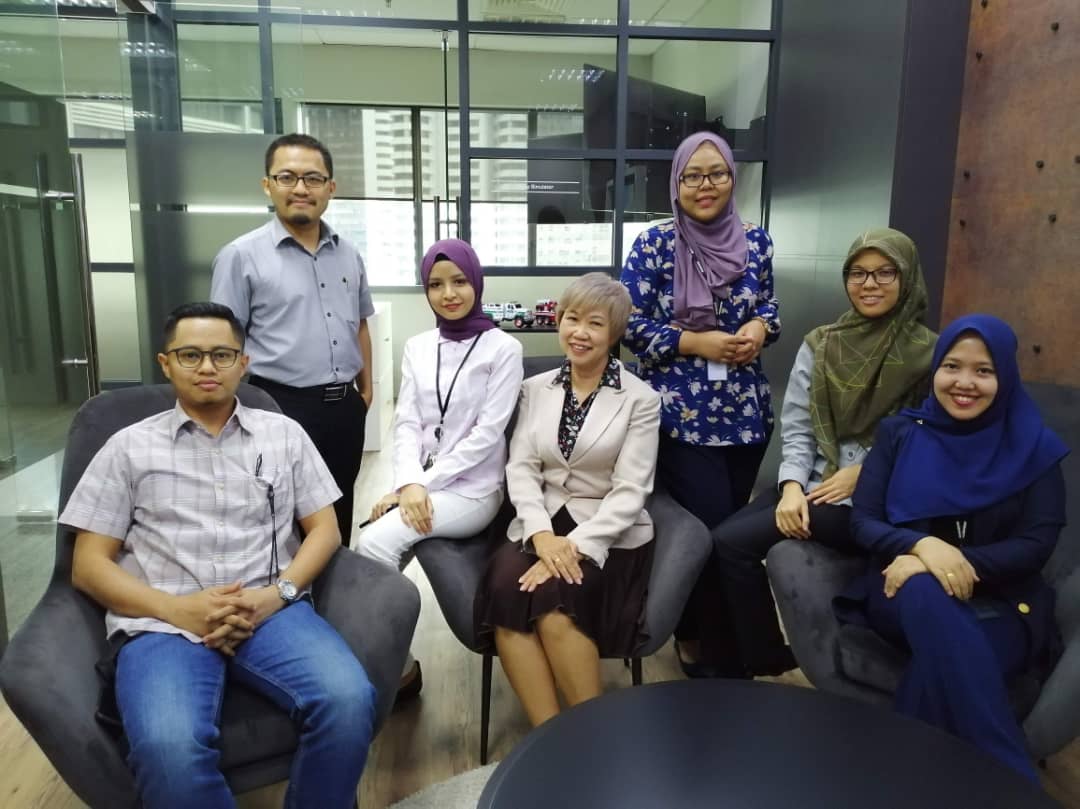
Prisca (centre in white jacket) now includes her life story in her training projects, sharing about how God has preserved her from young.
“A lot of people don’t want to relive their nightmare but I can because I am healed. I want to glorify God.
“I tell them my trust is in the One above because He will never fail me. What I am now is because He preserved me and gave me hope. He has lifted me from the miry pit and set my feet on the rock when I can stand (Psalm 40:2).”
“A lot of people don’t want to relive their nightmare but I can because I am healed.”
Her season of contemplation and prayer has also led her to a new ministry – intercessory prayer.
And she has learnt to let go of her expectations of her husband and to “love him with God’s love not my normal human love”.
She has learnt to see “the goodness in him”.
“He likes to clean the house,” she said. “I can see slowly over the years, he has changed for the better.”
The skinny little girl who once felt that she had to fight to show that she was of worth, now rests in the knowledge that she is “fearfully and wonderfully made” (Psalm 139:14).
MORE CHRISTMAS STORIES ON NEW BEGINNINGS:
We are an independent, non-profit organisation that relies on the generosity of our readers, such as yourself, to continue serving the kingdom. Every dollar donated goes directly back into our editorial coverage.
Would you consider partnering with us in our kingdom work by supporting us financially, either as a one-off donation, or a recurring pledge?
Support Salt&Light



